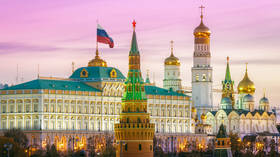US will pay if it confiscates Russia’s assets – Kremlin

Russia will not leave any US decision to hand over its frozen assets to Ukraine unanswered, Kremlin spokesman Dmitry Peskov told journalists on Saturday. He made the comment after the US Congress greenlighted what the Kremlin had described as “theft” of Russia's sovereign assets.
“America will have to pay for this, if it is indeed so,” the Peskov said. Moscow sets no time limit for responding to Washington’s steps, he stated, adding that Russia will tailor its response to “serve our interests in the best possible way.”
The US would hurt itself if it proceeds with such a plan, the Kremlin spokesman warned. Confiscating Russian assets undermines the principle of “inviolability of private… and state property,” he said. Such a move would prompt many investors to withdraw their money from the US and cause “irreparable damage to the US image,” Peskov believes.
Peskov did not elaborate on what specific measures Moscow could take in response to the seizure of its assets.
Earlier on Saturday, the US House of Representatives passed the Rebuilding Economic Prosperity and Opportunity (REPO) for Ukrainians Act, which essentially opened the way for the US government to liquidate frozen Russian assets and transfer the funds obtained to Ukraine.
The bill was adopted as part of a legislative package that also included authorizing $61 billion in additional spending on aid to Kiev. The emergency spending bill had been stalled in Congress since last fall as lawmakers were concerned that Washington lacked a strategy for victory or a peace settlement in the Ukraine conflict.
The EU and other G7 nations have blocked an estimated $300 billion in assets belonging to the Russian central bank since the start of the Ukraine conflict in 2022. Of that amount, €196.6 billion ($211 billion) is being held by the Belgium-based clearinghouse Euroclear. Since last year, those funds accumulated nearly €4.4 billion in interest.
The US, which holds only $6 billion out of the $300 billion in frozen Russian assets, had long been pushing its allies to seize the money outright. However, this approach has faced opposition from the European Central Bank (ECB) and criticism from the IMF and caused a rift among the G7 and EU political leadership.
Earlier in April, ECB President Christine Lagarde warned that seizing the assets would essentially amount to “a violation of the legal international order.”
Russia has repeatedly said that any actions taken against its assets would amount to “theft.” The Russian agency RIA Novosti also estimated in January that Moscow could respond to such an action by seizing assets belonging to the EU, G7, Australia, and Switzerland, all of which have investments in the Russian economy. The total volume of such holdings amounted to $288 billion at the end of 2022, according to RIA.













